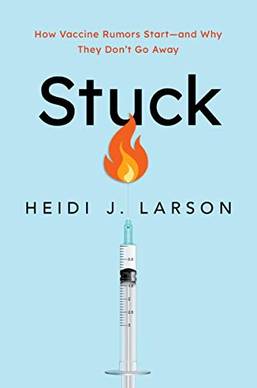Stuck: How Vaccine Rumors Start and Why They Don't Go Away
Book on vaccine rumors by Heidi J. Larson
Stuck: How Vaccine Rumors Start and Why They Don't Go Away is a book by Heidi J. Larson, published in 2020. The book explores the origins and persistence of vaccine rumors and misinformation, examining how these narratives spread and why they continue to influence public perception and behavior regarding vaccination.
Overview[edit | edit source]
The book delves into the complex social, cultural, and psychological factors that contribute to the spread of vaccine rumors. Larson, an expert in anthropology and public health, draws on her extensive research and experience to provide insights into the dynamics of vaccine hesitancy and the challenges faced by public health officials in combating misinformation.
Content[edit | edit source]
Origins of Vaccine Rumors[edit | edit source]
Larson traces the history of vaccine rumors, highlighting how they have evolved over time. She discusses the role of historical events, such as the smallpox vaccination campaigns, in shaping public attitudes towards vaccines. The book examines how rumors often arise from genuine concerns and fears, which are then amplified by social and cultural contexts.
The Role of Social Media[edit | edit source]
In the digital age, social media platforms have become a significant vector for the spread of vaccine misinformation. Larson analyzes how these platforms facilitate the rapid dissemination of rumors and how algorithms can exacerbate the problem by creating echo chambers. She also discusses the challenges of regulating misinformation without infringing on freedom of speech.
Psychological and Cultural Factors[edit | edit source]
Larson explores the psychological underpinnings of vaccine hesitancy, including cognitive biases and emotional responses. She also considers cultural factors, such as trust in authorities and the influence of community leaders, which can significantly impact vaccine acceptance.
Strategies for Addressing Vaccine Hesitancy[edit | edit source]
The book offers strategies for addressing vaccine hesitancy, emphasizing the importance of building trust and engaging with communities. Larson advocates for a more empathetic approach to public health communication, one that acknowledges and addresses the concerns of vaccine-hesitant individuals.
Impact[edit | edit source]
"Stuck" has been influential in shaping the discourse around vaccine hesitancy and misinformation. It has been used as a resource by public health professionals, policymakers, and educators to better understand and address the challenges of vaccine communication.
Related pages[edit | edit source]
Transform your life with W8MD's budget GLP1 injections from $125
W8MD offers a medical weight loss program NYC and a clinic to lose weight in Philadelphia. Our W8MD's physician supervised medical weight loss centers in NYC provides expert medical guidance, and offers telemedicine options for convenience.
Why choose W8MD?
- Comprehensive care with FDA-approved weight loss medications including:
- loss injections in NYC both generic and brand names:
- weight loss medications including Phentermine, Qsymia, Diethylpropion etc.
- Accept most insurances for visits or discounted self pay cost.
- Generic weight loss injections starting from just $125.00 for the starting dose
- In person weight loss NYC and telemedicine medical weight loss options in New York city available
- Budget GLP1 weight loss injections in NYC starting from $125.00 biweekly with insurance!
Book Your Appointment
Start your NYC weight loss journey today at our NYC medical weight loss, and Philadelphia medical weight loss Call (718)946-5500 for NY and 215 676 2334 for PA
Search WikiMD
Ad.Tired of being Overweight? Try W8MD's NYC physician weight loss.
Semaglutide (Ozempic / Wegovy and Tirzepatide (Mounjaro / Zepbound) available. Call 718 946 5500.
Advertise on WikiMD
|
WikiMD's Wellness Encyclopedia |
| Let Food Be Thy Medicine Medicine Thy Food - Hippocrates |
Translate this page: - East Asian
中文,
日本,
한국어,
South Asian
हिन्दी,
தமிழ்,
తెలుగు,
Urdu,
ಕನ್ನಡ,
Southeast Asian
Indonesian,
Vietnamese,
Thai,
မြန်မာဘာသာ,
বাংলা
European
español,
Deutsch,
français,
Greek,
português do Brasil,
polski,
română,
русский,
Nederlands,
norsk,
svenska,
suomi,
Italian
Middle Eastern & African
عربى,
Turkish,
Persian,
Hebrew,
Afrikaans,
isiZulu,
Kiswahili,
Other
Bulgarian,
Hungarian,
Czech,
Swedish,
മലയാളം,
मराठी,
ਪੰਜਾਬੀ,
ગુજરાતી,
Portuguese,
Ukrainian
Medical Disclaimer: WikiMD is not a substitute for professional medical advice. The information on WikiMD is provided as an information resource only, may be incorrect, outdated or misleading, and is not to be used or relied on for any diagnostic or treatment purposes. Please consult your health care provider before making any healthcare decisions or for guidance about a specific medical condition. WikiMD expressly disclaims responsibility, and shall have no liability, for any damages, loss, injury, or liability whatsoever suffered as a result of your reliance on the information contained in this site. By visiting this site you agree to the foregoing terms and conditions, which may from time to time be changed or supplemented by WikiMD. If you do not agree to the foregoing terms and conditions, you should not enter or use this site. See full disclaimer.
Credits:Most images are courtesy of Wikimedia commons, and templates, categories Wikipedia, licensed under CC BY SA or similar.
Contributors: Prab R. Tumpati, MD



